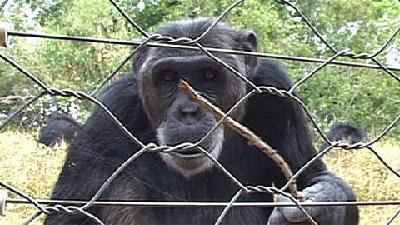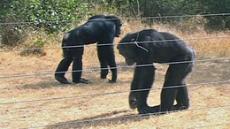More than a dozen sanctuaries across Africa shelter chimpanzees rescued from poaching, war, and other traumatic situations. Major efforts are being made to protect the endangered species.

It's a typical day at Sweetwaters Chimpanzee Sanctuary in Kenya's Ol Pejeta Conservancy. Two of its 41 residents are scrapping over food, while a third looks on and yelps in protest.
Kenya is their adopted homeland, having come from traumatic situations in West and Central Africa. Many were orphaned when their parents were killed for food, were imprisoned in cages, or were part of circus or other entertainment acts. The first chimps came to Sweetwaters from Burundi in 1993, following the outbreak of civil war there.
Rehabilitation and shelter
Veterinarian George Paul, senior supervisor at Sweetwaters Chimpanzee Sanctuary, said because of the abuse, many have serious behavioral problems.
"If they get distress, then they tend to more-or-less have self-inflicting behavior: either eating of feces, or hitting people with feces, or they even tend to have over-aggression within the populations," explained Paul.
Paul explained that Sweetwaters' goal is to rehabilitate the traumatized animals and provide them with a stimulating, stress-reducing environment that best mimics their natural environment. For instance, he said, caregivers will scatter food around the 250-acre plot rather than put it in one place.
"It may take the form of food. It may take the form of having complex, either ropes, either swings, either hammocks, sometimes also just trying to make the environment into a way that is not so obvious, so that they may not be able to utilize the whole environment, but they may be able to concentrate, so the day moves [faster]," said Paul.
Growing need for protection
Sweetwaters is one of 18 chimpanzee sanctuaries in 12 African countries caring for about 800 chimpanzees. They operate under the auspices of the US-based Pan African Sanctuary Alliance, which works toward primate protection and rehabilitation.
Executive director of the Jane Goodall Institute in South Africa, David Oosthuizen, said the number one threat against chimpanzees is the bushmeat trade, where chimps and other animals are killed for food. He said the trade is being fueled by overpopulation, and the resulting competition for food is particularly intense in Cameroon, Equatorial Guinea, and Central African Republic.
Baby chimps clinging to their dead parents often become pets or end up in entertainment acts.
"We have had chimps coming in to us wearing a t-shirt and pants and a Rolex watch, having been a family pet his entire life, knows not a single thing about what it means to be a chimpanzee, to live in trees, swing around and across on his feet, make a nest in the tree," said Oosthuizen.
He said a close second in threats to the chimpanzee is massive deforestation all across the continent, wiping out their natural habitat, something he noticed while on a recent rescue mission to Central African Republic.
"The level of deforestation has been so apparent. I keep referring it to, 'God has shaven the earth with a big razor,' because there is just no more forest left. You know, what was probably 20 or 30 years ago an absolute lush prime primate habitat has now made way to massive deforestation where the forest has just given way to smaller local towns and communities," said Oosthuizen.

Chimpanzees, classified as being an endangered species, are protected under the Convention on International Trade in Endangered Species, or CITES. It is estimated that there are 175,000 chimps remaining on the continent, mostly in West and Central Africa, with some in East Africa. Ol Pejeta Conservancy quotes scientists as predicting chimpanzees will be extinct in 50 years if current rates of decline continue.
Oosthuizen said that despite the CITES agreement, an increasing number of chimpanzees are being trafficked to many countries, where they often end up in laboratories as research experiments.
The combination of illegal trafficking, massive deforestation, and the bushmeat trade makes it difficult for rehabilitated chimpanzees to be released back into the wild. Conservationists would rather play it safe and protect the animals from all these additional dangers.
At Sweetwaters Chimpanzee Sanctuary, for instance, the animals are there for life. Paul said this is a mixed blessing.
"We are happy to have the chimps within. They do provide us with a constant, I can say, a source of joy watching them, looking at the kind of ethological similarities between them and humans," said Paul.
He said the animals at his facility play an important role as "ambassadors," educating visitors on the many dangers facing them and the importance of chimpanzee conservation.
feces: waste matter eliminated from the bowels; excrement 粪便,排泄物
bushmeat: meat taken from any animal native to African forests, including species that may be endangered or not usually eaten outside Africa(野生动物的)肉
Genome shows humans more gorilla-like than thought
(来源:VOA 编辑:崔旭燕)
关注和订阅


电话:8610-84883645
传真:8610-84883500
Email: languagetips@chinadaily.com.cn